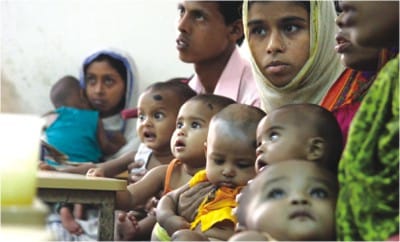Diarrhoea outbreak escalates further

Parents from even outside the capital are now showing up at the ICDDR,B at Mohakhali with their children as diarrhoeal diseases continue to spread in the capital and across the country. Photo: SK Enamul Haq
Jamila, 30, was lying on a bed at the city's International Centre for Diarrhoeal Disease Research, Bangladesh (ICDDR, B). She was suffering from diarrhoea.
She came from the city's Nandipara. She complained that the water supplied by the Water and Sewerage Authority (Wasa) is stinky and dirty.
“I couldn't boil the water due to gas crisis,” said Jamila adding that many of her neighbours had also been admitted to ICDDR,B.
Like Jamila, a huge number of patients throng ICDDR, B every day from city's Mirpur, Khilgaon, Rampura, Badda, Mohammadpur, Demra, Narayanganj and other places.
The number is increasing every day. The highest number of patients admitted on Sunday was 1008.
Dr Azharul Islam Khan, head of the Short Stay Unit, said during this period last year the high frequency of patients didn't persist long.
“It was only one day when the number of patients crossed 1020. Otherwise it was more than 800. But this time more than 900 patients are coming for quite a long time,” he said.
On an average, more than 40 patients seek treatment at the hospital everyday, which is quite double the number of the 1st week of March, he said.
By 6:00 pm yesterday a total of 716 patients sought treatment at the ICDDR,B.
Most of the patients coming to the hospital are from low-income group and they complained that the water supplied by the Wasa is smelly and black.
“For the last one and a half months the water has been dirty. Despite repeated complaints, Wasa hasn't taken any measures in this regard.” Said Liza who lives at city's Adabor area at Mohammadpur.
She informed that three members of her family are suffering from diarrhoea.
Wasa sources, however, claimed that 87 percent of the water supplied by Wasa is collected from underground which is clean.
Wasa's main challenge now is to meet the demand of the city people and through its 31 vehicles it is providing safe water to the areas where there are acute water crisis.
If there is leakage in the water line, the dirty water may enter into the pipe and contaminate it, they said.
Very soon Wasa will be able to provide safe water to the slum areas with the help of the NGOs, sources said.
Furthermore, Wasa has taken a long-term project funded by the ADP to replace all the pipelines in the city, sources added.

 For all latest news, follow The Daily Star's Google News channel.
For all latest news, follow The Daily Star's Google News channel. 



Comments